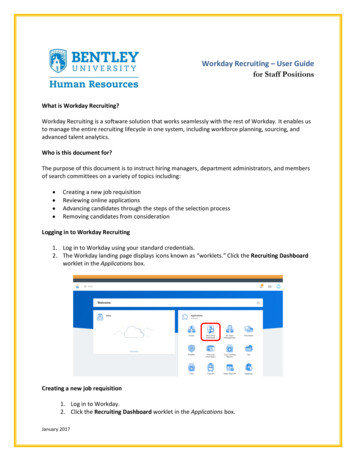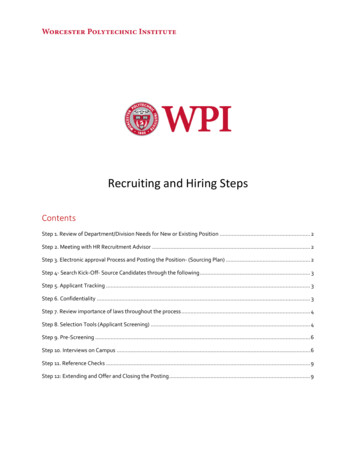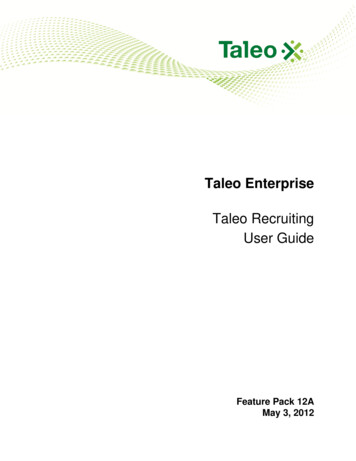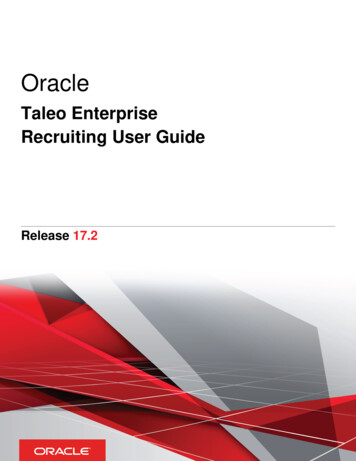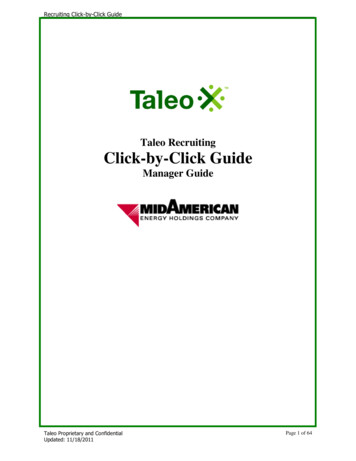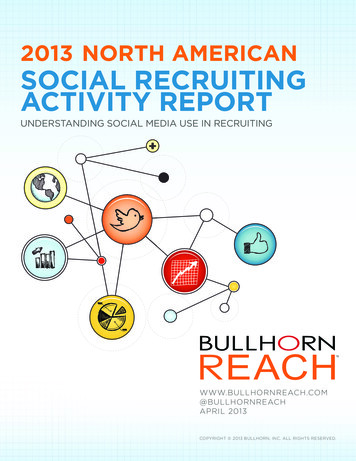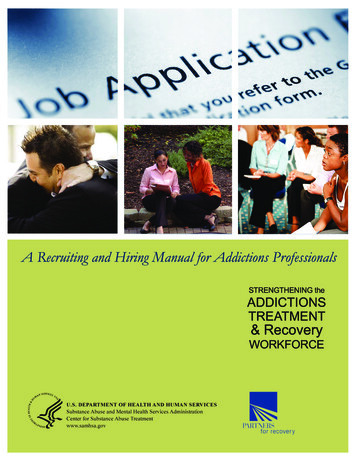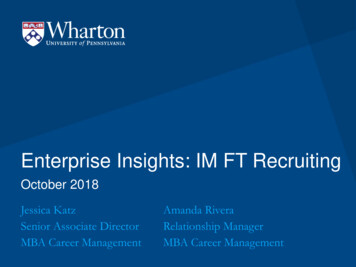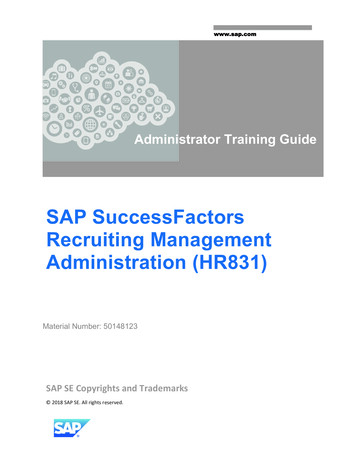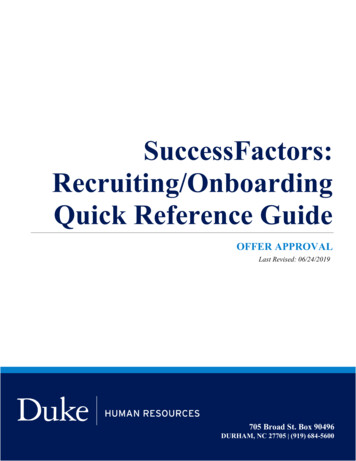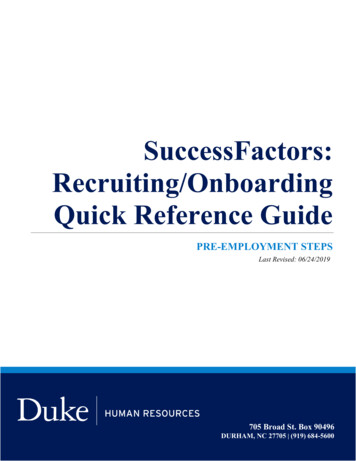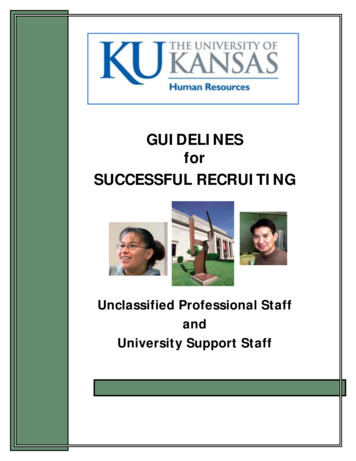
Transcription
GUIDELINESforSUCCESSFUL RECRUITINGUnclassified Professional StaffandUniversity Support Staff
TABLE OF CONTENTSINTRODUCTION .1Helpful Information .2Goals of a Successful Recruitment Process .3Overview of Process Changes .3Overview of the Recruitment Process .4Chapter 1 – Area Administrator/Hiring Authority Responsibilities .5Chapter 2 - Search Committee – Candidate Associations (Conflict of Interest) .6-7Chapter 3 - Position Description .8-9Chapter 4 - Recruitment Area/Advertising . 10-11Chapter 5 - Broadening the Pool of Applicants . 12-13Chapter 6 - The Screening Process . 14-15Chapter 7 - The Interview . 16-18Chapter 8 - References . 19Chapter 9 - Selection/Recordkeeping . 20-21Chapter 10 - Recruitment Exceptions/Salary Increases/Pools . 22-24Glossary of Terms. 25-28Appendix A - Search Committe Chair Checklist . 29-30Appendix B - Sample Required Qualifications . 31Appendix C - Sample Screening Instrument . 32Appendix D - Sample Interview Questions . 33-35Appendix E - Guidelines for Inquiries . 36Appendix F - Sample Interview Evaluation Form . 37Appendix G - Sample Reference Questions . 38Revised September 2015
INTRODUCTIONThe University of Kansas is proud of its commitment to helping secure employment for allinterested individuals. All university policies and programs allow equal opportunity foremployment, conditions of employment, services and participation in university activitiesregardless of race, color, ethnicity, religion, sex, national origin, age, ancestry, disability,status as a veteran, sexual orientation, marital status, parental status, retaliation, genderidentity, gender expression and genetic information in the University’s programs andactivities.Each search conducted for a University position should include proactive initiatives forincreasing diversity, and provide equal opportunity for all potential applicants. As apremier international research university, the University of Kansas is committed to anopen, diverse and inclusive learning and working environment that nurtures growth anddevelopment of all. KU holds steadfast in the belief that an array of values, interests,experiences, and intellectual and cultural viewpoints enrich learning and our workplace.The promotion of and support for a diverse and inclusive community of mutual respectrequires the engagement of the entire University. Everyone at KU must play a role increating an inclusive environment.The University generally expects units to conduct external searches for all unclassifiedprofessional and university support staff appointments, including appointments for visitingand part-time positions. Internal searches may be conducted in those instances whereinstitutional experience is necessary at the onset of the appointment in order tosuccessfully meet the objectives of the position. However, all appointments must conformto equal opportunity and affirmative action guidelines for inclusion. Any waiver from thesuggested recruitment guidelines must be approved by the Office of InstitutionalOpportunity and Access (IOA) and the Department of Human Resources Management(HRM) before an offer of employment is extended.These guidelines have been compiled to assist university personnel in conducting searchesfor unclassified professional staff and university support staff. While staff recruitment isthe primary focus of this training, student hourly recruitment will also be touched upon.The recommendations contained in these guidelines are intended to further theuniversity’s efforts to eliminate discrimination, take affirmative action, and to fully engagein equal opportunity principles.Persons with inquiries related to discrimination should contact the Director of the Office ofInstitutional Opportunity and Access, IOA@ku.edu, 1246 W. Campus Road, Room 153A,Lawrence, KS, 66045, (785) 864-6414, 711 TTY.1
HELPFUL INFORMATIONUnclassified Professional Staff and University Support StaffHR Website: http://www.humanresources.ku.eduEmail: employ@ku.eduApplicant Website: https://employment.ku.eduContacts:Angie LovingAssistant Directoraloving@ku.edu864-1770Cindy NitcherSr. Recruitment Coordinatorcnitcher@ku.edu864-2256Terri OsbornSr. Recruitment Coordinatortosborn@ku.edu864-7140Robin TorezSr. Recruitment Coordinatorrtorez@ku.edu864-1265Jessica WebbSr. Recruitment Coordinatorjessicawebb@ku.edu864-1266Key Information: Search Committee System Access: To view application materials go to the main HRManagement webpage and select “Search Committee Login” under the quick links or go tohttps://trm.brassring.com/ku. Under quick links you can also select “Hiring Process” then“BrassRing” to view a Quick-Start video and User Guide. Applicants for staff and studentpositions must apply to the online system. Classification & Compensation: For a current list of job titles, job title summaries, minimumqualification and salary ranges that were created during the Compensation & Market StudyProject, visit the main HR Management webpage and select “Services” and then go to“Compensation” or go to http://humanrsources.ku.edu/compensation. Refilling Vacant Staff Positions: Except for USS positions covered by a bargaining unit, allvacant positions will be filled as Unclassified Professional Staff (UPS). Shared Service Centers SSC’s: KU wants all new employees to feel welcomed to campusand be prepared for their positions. These Centers help make onboarding a quick and simpleprocess for new employees to complete necessary hiring documents and to learn aboutavailable services and trainings offered by the University. For more information about services,go to ng. Recruitment Guidelines: A copy of these guidelines can be found s.ku.edu/files/docs/UPS USS Recruit Guidelines.pdf. Moving Expenses: For guidelines on moving expenses go omptroller-CAS-MovingExpenses.htm. Background Checks: Background checks are required on all newly hired or rehired (after abreak in service of one year or longer) faculty and staff appointed to regular positions, currentor newly hired faculty/staff appointed to “serve at the pleasure of” positions, temporary/regularlecturers, salaried student employees, and temporary or limited-term appointments. Thoseholding a graduate salaried appointment (GTA/GRA/GA) moving to a different graduateappointment are required to complete a background check if one has not previously been done.Student hourly employees are required to have a background check through the NationalSexual Offender Registry. Any student hourly working with non-KU minors is required tocomplete a full background check. For more information about these guidelines go to:https://documents.ku.edu/policies/Human Resources/BackgroundCheck.htm. Probation: There is a six-month probationary period for staff that are newly hired or rehiredinto regular positions. The policy also provides for an extension of the probationary period andfor the initiation of a new probationary period in the event that an employee serving aprobationary period accepts a different position that is substantially different in job duties orrequires different qualifications.2
GOALS OF A SUCCESSFUL RECRUITMENT PROCESS To attract and retain highly qualified individuals to the University of Kansas To select a candidate that has the potential for succeeding in an inclusive and supportiveenvironmentTo engage in active recruitment of members of traditionally underrepresented groupsTo provide potential applicants an equal access to apply and compete for vacanciesTo comprehensively gather information about each applicant’s qualifications for a vacancyTo attract a pool of qualified diverse applicantsTo interview a pool of qualified applicants that includes representation of underrepresentedgroupsOVERVIEW OF PROCESS CHANGESIn accordance with the Changing for Excellence initiative, and the ongoing goal to reduce theadministrative burdens during the hiring process, the following changes were enacted in 2012. Recruitment and onboarding activities will be facilitated by the establishment of Shared ServiceCenters (SSC’s) by developing experts in search and HR/Pay guidelines Search training is now optional, but encouraged Optional Use of Search Committees: Hiring departments may opt to forgo search committeesfor non-faculty searches There is no minimum number of applicants required to be interviewed for staff or studentpositions All new hires need to visit their assigned SSC on or before their first day of work to completehiring documents Probationary period required for all newly hired and rehired regular staffImageNow will be used to update and retain online position descriptionsDecreased Human Resources Management (HRM) oversight in order to streamline hiring: HRMno longer approves interview pools; Departments no longer need HRM approval to make offerswithin the hiring range; and Equal Opportunity oversight has shifted from a comprehensivereview during the search to post-offer auditsStudent hourly hiring administration shifted from HRM to SSC’s to manage3
OVERVIEW of the STAFF RECRUITMENT PROCESSSTEP 1BEGIN THESEARCH STEP 2SCREEN ANDRECOMMENDFORINTERVIEW Accept applications through the online applicant system Prepare a screening instrument to evaluate each applicant. The SSC can provide STEP 3INTERVIEWANDSELECTIONVerify through administrative channels permission to begin a searchSelect a search committee (optional)Determine job related criteria and documents to be collected from applicantsDevelop and/or update the position description and complete the SSC’s checksheet OR go to https://my.ku.edu/uPortal - “Employee Info “ and then“Recruitment Toolbox” for the necessary links to launch a recruitmentA SSC staff member submits the requisition to Central HRM for review and finalapproval for staff positionsStudent hourly jobs are posted by the assigned SSC (3-day posting minimum)The SSC can assist in writing and placing adsAll jobs are posted to the University’s employment website athttp://employment.ku.eduhiring departments with a standardized screening tool or departments may createtheir ownOnce the application review date or deadline has passed, rank applications basedupon required and preferred qualifications listed in the position description(optional for student jobs)If additional information needs to be collected to help evaluate applicants a phoneinterview may be scheduledHRM no longer approves applicants for interview and departments are expected toprovide a summary of applicant statuses prior to making a final offerCollect and place in departmental search file copies of ads, correspondence withapplicants and completed screening instruments or submit the entire file to yourSSC representative for document scanning and retention at the conclusion of thesearchSchedule interviews - the SSC can assist departments with this stepPrepare interview questionsConduct interviews in a consistent manner using permissible inquiriesCheck references before making an offerProvide a final statement on the screening tool for each applicant interviewed, aswell as a final status for any applications received after the initial review date Make a verbal offer to the desired candidate and contact the SSC to enter theonline offer (Verify with administrative hierarchy final approval to make an offer) NOTE: Appointments can no longer be backdated and no one should startworking before they have been onboardedSTEP 4HIRE Applicant accepts online offer All hired candidates should go to the SSC to be onboarded on or before the dateof hire. Those working outside the Lawrence area can make arrangements to beonboarded on-site or remotely. If hiring someone new, those with a break in service of more than 12 months, orthose whose position is designated as “serve at the pleasure of”, HRM will place abackground order with HireRight Ask the SSC to notify unsuccessful candidates Close out the search by sending the search materials to the SSC for scanning andrecord retention4
CHAPTER 1AREA ADMINISTRATOR RESPONSIBILITIESGenerally the Area Administrator, orHiring Authority, is the person(s) whoultimately makes the final hiring decision,and is therefore responsible for thefollowing: Ensures that the search committeemembership is diverse. Ensures the equitable treatment of allapplicants throughout the entirerecruitment process, which includes thescreening, interview, and referencechecking. Ensures that the search process isconducted in accordance with Universityguidelines and procedures, includingpolicies related to equal opportunity andaffirmative action. Refers to the University’s AffirmativeAction Plan and reviews the statisticalanalysis for the position to be filled.This analysis should assist indetermining the scope of the search,outreach efforts, newspapers andjournals for advertisements, and give abenchmark for the number ofunderrepresented persons which mightbe expected in the applicant pool. Ensures that there is a positiondescription for each UnclassifiedProfessional Staff (UPS) and UniversitySupport Staff (USS) position in the unit.An updated position description isrequired and will provide basicinformation needed to begin therecruitment process. Ensures that the search committeeunderstands:o What is expected of them and theirrole in the search processo The position responsibilitieso What they are looking for in an idealcandidateo What specific skills, abilities,experiences are necessary toperform the jobo That all information related to thesearch process is confidentialo How to respond to and managecandidate associations5
SEARCH COMMITTEE Throughout the entire hiring process,the search committee needs to maintainconfidentiality and not discuss anyaspect of the search outside of thesearch committee meetings. Overheardconversations can lead tomisunderstandings and misinformation. Search committees are encouraged toconsult with a representative from HRMor their SSC representative at any timeto discuss screening, appropriateinterview questions, diversity issues,confidentiality, reference checks, or anyother information related to therecruitment process. In the event that a member cannotparticipate in all stages of the processconsult HRM. If the committeemembership changes, notify HRM or theSSC so the search record can beupdated. Questions from applicants regardingperceived inequities in the recruitmentprocess should be referred to the Officeof Institutional Opportunity and Access(IOA). Questions from applicantsregarding their status within the searchthat are procedural should be referredto the search committee chair or toHRM. The size of the search committeemembership can affect the progress ofthe search. Calendaring for multiplemembers is complicated and may drawthe search out too long. In some cases,the top candidate(s) may be forced toaccept other positions. Search committees should includemembers of underrepresented groupsor other individuals who can bring adiverse point of view to theproceedings. It is helpful to includepersons who have different perspectivesdue to their various roles in theUniversity community. Undergraduatestudents, graduate students and otherUniversity community personnel mayserve on search committees.6CHAPTER 2 Search committee members should gaina full understanding of their charge andthe limits of their authority andresponsibility at the beginning of theprocess. To be most effective it isrecommended that search committeesbe charged by the Area Administratorfor a clear understanding of their role indetermining applicants’ qualifications,interview guidelines, reference contacts,and expectations for making finalcandidate recommendations (rankedversus unranked).Beginning October 2012 searchcommittees are no longer required;however, as the recruitment process canbe subjective, utilizing a searchcommittee can add objectivity to theprocess. See Appendix A for a SearchCommittee Chairperson ResponsibilitiesChecklist.
CANDIDATE ASSOCIATIONSAssociation: might involve an applicantthat is a family member, someone withwhom there is or has been a pastconsensual relationship, or a committeemember who supervises, or hassupervised the applicant previously. Insuch instances, it is recommended thatthe search committee member resignfrom the committee or at least notparticipate in any discussion about thatapplicant. However, in the case of afamily member, or a consensualrelationship, the search committeemember must resign from thecommittee to eliminate any possibility ofa conflict of interest. CASUAL Association: might includehaving served on a committee with theapplicant or knowing the applicantthrough a non-work related association.In this instance, simply disclose to thesearch committee the nature of theassociation. Should an applicant name a searchcommittee member as a reference, it isrecommended that the committeemember consider in which capacityhe/she will serve since one cannotobjectively be both. In the event thesearch committee member declines toserve as a reference, ask the applicantto name a replacement. If a searchcommittee member is familiar with anapplicant from a previous search, thecommittee member should avoiddiscussing the previous search details.The previous information may havechanged and should not be used,especially in a decision making manner.If the previous search revealed items ofconcern, they must be relevant andsubstantiated. PROFESSIONAL Association: mightinvolve working together as colleaguesor co-workers. In this instance, it isrecommended that the committeemember not actively participate in thediscussion of this applicant. If it iscritical that the committee memberparticipate in discussions, then anyinformation (negative or positive)should be substantiated by outsidereferences that can lend additionalobjectivity.7CHAPTER 2 CLOSE PROFESSIONAL / PERSONALIt is not that unusual for searchcommittee members to know one or moreof the applicants applying for theiropening and such associations mightcause other applicants to feel theselection process was not equitable. Theperception of fairness and transparency isessential to the success of each search.The following guidelines are a startingpoint from which to have a discussionwith those involved, including the AreaAdministrator, search committeemembership, IOA and/or HRM.
POSITION DESCRIPTIONcategories and use separate paragraphsto desc
3. GOALS OF A SUCCESSFUL RECRUITMENT PROCESS To attract and retain highly qualified individuals to the University of Kansas To engage in active recruitment of members of traditionally underrepresented groups To provide potential applicants an equal access to apply and compete for vacancies To comprehensively gather inform
